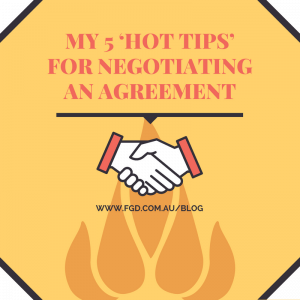
Alternative dispute resolution (ADR) is all the rage these days. Whether through lawyers, third party professions or directly – the ADR process keeps people focused on the issues and (for the most part) avoid disputes going to Court.
The list of process options available to help our client to resolve disputes is constantly expanding, including collaboration, arbitration, round-table conferences, mediation, conciliation. What all of these processes have in common are that negotiation skills make their wheels turn.
I see it is being a significant part of my role as a family and estates lawyer to negotiate agreements on behalf of or with my clients. Here are my ‘hot tips’ for negotiating:
- Don’t make it personal – face the issues not the person. Some people find it helpful to use aid memoirs, such as a table of assets and liabilities, so that you don’t have to maintain eye contact and have a reference point for the conversation.
- Practice principled negotiation – Focus on your interests and create shared goals that measure the success of your deal, rather than a ‘bottom line’ that is inflexible.
- Know your BATNA – your ‘best alternative to a negotiated agreement’ (eg. Have gotten advice about the likely outcome Court).
- Brainstorm options – don’t let yourself prejudge options and close the gate on options that might well achieve a greater mutual outcome.
- Assume positive intent. Don’t attack or assume the worst when you disagree with someone. Reframe it to discuss interests.
If you are thinking of negotiating an agreement, whether directly with your former partner or through an ADR process, contact me to assist you to plan for the negotiation and skill you up to make the most of it!

Courtney Mullen is a Family and Estates Lawyer at Farrar Gesini Dunn, Canberra Office.